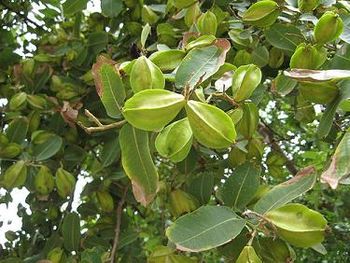Terminalia Arjuna
From Wikiwel
(Redirected from Arjuna)
See also : Terminalia
Other Names: Arjan des Indes, Arjuna, Axjun Argun, White Marudah, Arjun, Arjuna, Koha, Kahu, Arjan, Sadada, Sadado, Bili-Holo-Nir-Tora Matti, Maddi, Arjuna, Arjun Sadada, Sadura, Dhanvi, Indradruma, Kakubha, Karvirak, Sahajo, Vellamatta, Marudha Maram, Yerra maddi, Orjun, Arjhan, Arjun tree
Special Precautions of Terminalia Arjuna
- Terminalia arjuna is POSSIBLY SAFE when used short-term (for three months or less). But don’t use it without medical supervision. It might affect your heart.
- Pregnancy and breast-feeding: There is some evidence that Terminalia arjuna is POSSIBLY UNSAFE during pregnancy. The safety of the other two species during pregnancy is unknown. It’s best to avoid using any terminalia species.
- There isn’t enough information about the safety of terminalia during breast-feeding. Stay on the safe side and avoid use.
The benefits of Terminalia Arjuna are
- In traditional Ayurvedic medicine, Terminalia arjuna has been used to balance the three “humors”: kapha, pitta, and vata. It has also been used for asthma, bile duct disorders, scorpion stings, and poisonings.
- The bark of Terminalia arjuna has been used in India for more than 3000 years, primarily as a heart remedy. An Indian physician named Vagbhata has been credited as the first to use this product for heart conditions in the seventh century A.D. Research on terminalia has been going on since the 1930s, but studies have provided mixed results. Its role, if any, in heart disease still remains uncertain.
- Disorders of the heart and blood vessels (cardiovascular disease), including heart disease and related chest pain (angina) after a heart attack, when used with conventional medications.
- Treating congestive heart failure (CHF), when used with conventional medications., high blood pressure, and high cholesterol.
- It is also used as “a water pill,” and for earaches, dysentery, sexually transmitted diseases (STDs), diseases of the urinary tract, and to increase sexual desire.
- Antimicrobial : Casuarinin, a tannin isolated from the bark of Terminalia arjuna, was studied by the Graduate Institute of Pharmaceutical Science at Taiwan's Kaohsiung Medical University to see if it had any effect against the herpes simplex type 2 virus in vitro. Casuarinin exhibited antiviral activity even 12 hours after infection. It also prevented the attachment of HSV-2 to cells and prevented the virus from penetrating the cell membranes.
- Antioxidant : A Chinese study by the Department of Pharmacology at Tibet Nationalities Institute investigated the antioxidant and free radical scavenging capacities of arjunic acid, an aglycone obtained from the fruit of Terminalia arjuna. Results showed that arjunic acid was a strong antioxidant and a free radical scavenger, more potent than ascorbic acid.
- Cardiovascular Disease : Results published in the May 1995 International Journal of Cardiology found that supplementation with arjuna bark extracts improved heart function as well as lung congestion in patients with severe congestive heart failure. Patients showed improvement in heart function within two weeks, which continued over the course of two years of treatment.
- Cholesterol : Arjuna has been shown to be a safe and effective cholesterol-managing herb. A healthy heart begins with normal cholesterol levels. The arjuna herb lowers cholesterol levels by speeding up the conversion of LDL cholesterol in the liver. A study conducted by the Central Drug Research Institute in India studied the effect of arjuna on the cholesterol levels of rats. Two groups of rats were fed a high cholesterol diet for a month. Those who received arjuna powder had lower LDL cholesterol levels and higher HDL cholesterol levels. High HDL levels are beneficial because they reduce your risk of heart disease.
- Liver Cancer : Researchers at the Department of Pharmacology and Environmental Toxicology, University of Madras, evaluated the antioxidant nature of ethanolic extract of Terminalia arjuna bark (EETA) on induced liver cancer in male Wistar albino rats. The extract offered significant protection against damage caused by lipid peroxides, indicating an antioxidant activity of arjuna bark against this type of induced liver cancer. Another Madras study found that arjuna killed cancer cells from the HepG2 human liver cancer cell line in vitro.
- Ulcers : A study published in the August 2007 issue of Phytotherapy Research reported that a methanol extract of the bark of Terminalia arjuna show marked anti-ulcer and ulcer healing activity against induced ulcers in laboratory animals. The results indicated that the protective effect of the extract is related to its ability to maintain healthy membrane tissue in the digestive tract as well as strengthening the mucosal barrier, which is the first line of defense against ulcers.
- Wound Healing : Researchers at India's CU Shah College of Pharmacy studied the effects of a 50 percent ethanolic extract from the arjuna bark and also tannins isolated from the bark for their ability to heal wounds. The findings revealed a statistically significant increase in the tensile strength of the incision wounds and shrinking of the wound size compared to a control, although the topical treatment with tannins was found to be better than the extract. The tannins caused rapid collagen turnover, leading to rapid healing of the wounds.
